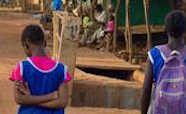University of Otago researchers are exploring a vast array of factors that affect the health and wellbeing of young New Zealanders, and we're sharing our expertise internationally too.
A Better Start National Science Challenge
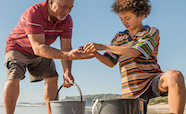 Better science together for a better start in life
Better science together for a better start in life
Our children are our future, we want to give them the best possible start in life. Getting a good start includes being a healthy weight, learning successfully and being mentally well. That's what all families, whānau and communities want for their tamariki. But obesity, learning and mental health are challenges for some children.
Our mission is to find better ways to predict, prevent and treat obesity, learning and mental health problems in children and teenagers.
University of Otago researchers contribute in the Science Leadership Team and in projects.
E Tipu e Rea—Grow and Branch Forth
Email contact@abetterstart.nz
Web www.abetterstart.nz
ASPIRE Aotearoa
 ASPIRE Aotearoa is a partnership between major New Zealand research groups carrying out research to help achieve the Government's goal of a tobacco-free Aotearoa by 2025. ASPIRE Aotearoa brings together leading tobacco-free researchers and health service groups in New Zealand and strengthens existing collaborations. ASPIRE Aotearoa is a University of Otago Research Theme.
ASPIRE Aotearoa is a partnership between major New Zealand research groups carrying out research to help achieve the Government's goal of a tobacco-free Aotearoa by 2025. ASPIRE Aotearoa brings together leading tobacco-free researchers and health service groups in New Zealand and strengthens existing collaborations. ASPIRE Aotearoa is a University of Otago Research Theme.
Email aspire.aotearoa@otago.ac.nz
Web aspireaotearoaorg.nz
Te Rōpū Rangahau ō Te Kāhui Matepukupuku | Cancer Society Research Collaboration
 We aim to reduce the incidence and impact of cancer in New Zealand, and to reduce cancer-related inequalities.
We aim to reduce the incidence and impact of cancer in New Zealand, and to reduce cancer-related inequalities.
We work in close coordination with the Cancer Society of New Zealand to prioritise the research we conduct, disseminate our findings, and advocate for world-leading cancer prevention, care and support.
Our partners include Massey University, Michigan State University, The University of Melbourne, and Victoria University of Wellington.
Email louise.signal@otago.ac.nz
Web otago.ac.nz/cancer-society-research
Centre for International Health
The Centre for International Health facilitates and promotes research to contribute to the understanding and improvement of health in under-resourced countries, and focuses on postgraduate training and strategic mentorship of leaders.
Researchers interests include:
- Anaemia and micronutrient deficiencies, child under-nutrition, and effectiveness of maternal and child health interventions
- Mycobacterium tuberculosis infection and disease, Streptococcus pneumoniae carriage, disease, and vaccination
- The syndrome of fever in resource-limited areas, Salmonella and other invasive bacterial infections, bacterial zoonoses, diagnostics and ethics in global health
Email internationalhealth@otago.ac.nz
Web otago.ac.nz/internationalhealth
Childhood sexual abuse
In the Department of Psychological Medicine, Dunedin School of Medicine, there is a broad programme of research that focuses on the influence of childhood sexual abuse on adult outcomes.
Specifically, research is currently being conducted examining male's experience of sexual abuse and the resulting sequelae, the effects of sexual abuse over time (i.e., in older age), and also a new research initiative with international collaborators examining post traumatic growth via group treatment with sexual abuse survivors. Both qualitative and quantitative methods are used to examine childhood sexual abuse issues.
Email tess.patterson@otago.ac.nz
Web otago.ac.nz/dsm-psychmed/research/otago634501.html
Christchurch Health and Development Study
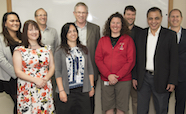 The Christchurch Health and Development Study ( CHDS ) has been in existence for 40 years. During this time we have followed the health, education and life progress of a group of 1,265 children born in the Christchurch (New Zealand) urban region during mid-1977.
The Christchurch Health and Development Study ( CHDS ) has been in existence for 40 years. During this time we have followed the health, education and life progress of a group of 1,265 children born in the Christchurch (New Zealand) urban region during mid-1977.
The cohort has been studied from infancy into childhood, adolescence and adulthood. Data gathered over the course of the study now comprises some 50 million characters of information, with which the study has published over 500 scientific papers, reports, books and book chapters describing the life history of the CHDS cohort.
In 2019, we completed our participant interviews for their 40-year assessment.
CHDS current research objectives
Email CHDS.UOC@otago.ac.nz
Web otago.ac.nz/christchurch/research/healthdevelopment
Edgar Diabetes and Obesity Research ( EDOR )
 Our mission is to make a significant contribution to reducing the global burden of diabetes and obesity through research and dissemination of knowledge. We aim to reduce the prevalence, and to improve the management, of diabetes and obesity by finding new ways to prevent and treat these conditions. By striving for research excellence and encouraging international collaboration we can bring the greatest benefit to New Zealanders and the wider world. We're sharing our discoveries with individuals, communities, teachers, health professionals and policymakers.
Our mission is to make a significant contribution to reducing the global burden of diabetes and obesity through research and dissemination of knowledge. We aim to reduce the prevalence, and to improve the management, of diabetes and obesity by finding new ways to prevent and treat these conditions. By striving for research excellence and encouraging international collaboration we can bring the greatest benefit to New Zealanders and the wider world. We're sharing our discoveries with individuals, communities, teachers, health professionals and policymakers.
Our child-health-related research includes:
- APPLE: A pilot programme for lifestyle and exercise
- BLISS: Baby-led introduction to solids
- Family-based Pacific child obesity prevention
- MInT: Motivational interviewing in treatment
- Play study
- POI:Prevention of overweight in infancy
Email diabetes@otago.ac.nz
Web otago.ac.nz/diabetes
Health, Environment and Infection Research Unit ( HEIRU )
 The Health, Environment and Infection Research Unit is a collaboration of researchers focused on the impact of infectious diseases and adverse environmental factors on population health. We use a range of research methods to investigate these health concerns; to identify effective interventions to reduce the burden of disease and inequalities; and to support the move to greater environmental sustainability. HEIRU aims to provide evidence-based recommendations and advice to support New Zealand and international agencies and practitioners in their disease prevention and control activities.
The Health, Environment and Infection Research Unit is a collaboration of researchers focused on the impact of infectious diseases and adverse environmental factors on population health. We use a range of research methods to investigate these health concerns; to identify effective interventions to reduce the burden of disease and inequalities; and to support the move to greater environmental sustainability. HEIRU aims to provide evidence-based recommendations and advice to support New Zealand and international agencies and practitioners in their disease prevention and control activities.
Email michael.baker@otago.ac.nz
Webotago.ac.nz/wellington/departments/publichealth/research/heiru
Healthier Lives – He Oranga Hauora National Science Challenge 2015–2024
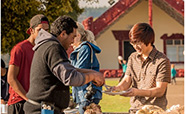 The Healthier Lives – He Oranga Hauora National Science Challenge was a national research collaboration dedicated to achieving healthier lives for all New Zealanders.
The Healthier Lives – He Oranga Hauora National Science Challenge was a national research collaboration dedicated to achieving healthier lives for all New Zealanders.
It has contributed evidence, technology and tools that can help to achieve more equitable health outcomes in Aotearoa New Zealand.
The website remains available as a resource and for archived materials.
Health Promotion and Policy Research Unit ( HePPRU )
 The Health Promotion and Policy Research Unit aims to foster excellence in research in health promotion and public health policy. HePPRU works in collaboration with policy-makers and policy advocates to advance the good health of the peoples of Aotearoa/New Zealand through independent, critical and innovative research, teaching, and community service.
The Health Promotion and Policy Research Unit aims to foster excellence in research in health promotion and public health policy. HePPRU works in collaboration with policy-makers and policy advocates to advance the good health of the peoples of Aotearoa/New Zealand through independent, critical and innovative research, teaching, and community service.
Email louise.signal@otago.ac.nzWeb otago.ac.nz/heppru
He Kainga Oranga | Housing and Health Research Programme
 He Kainga Oranga, the Housing and Health Research Programme, examines and clarifies the links between Housing and Health. Although the association between poor housing and ill health is known, the links that make up the causal chain have until recently been poorly understood. Conducting our own studies and examining existing evidence enables us to identify and evaluate housing-related interventions to improve individual, family and community health. Our multi-disciplinary team has expertise in both qualitative and quantitative disciplines.
He Kainga Oranga, the Housing and Health Research Programme, examines and clarifies the links between Housing and Health. Although the association between poor housing and ill health is known, the links that make up the causal chain have until recently been poorly understood. Conducting our own studies and examining existing evidence enables us to identify and evaluate housing-related interventions to improve individual, family and community health. Our multi-disciplinary team has expertise in both qualitative and quantitative disciplines.
- Housing and childhood respiratory illness
- Rheumatic fever and housing conditions
- Cool? Exploring fuel poverty with youth
Email healthyhousing@otago.ac.nzWeb healthyhousing.org.nz
Injury Prevention Research Unit
 The Injury Prevention Research Unit ( IPRU ) undertakes research that contributes to reducing the incidence, severity and consequences of injury in New Zealand.
The Injury Prevention Research Unit ( IPRU ) undertakes research that contributes to reducing the incidence, severity and consequences of injury in New Zealand.
Child home safety research project
Email iprunz@otago.ac.nz
Web blogs.otago.ac.nz/ipru
New Zealand Child and Youth Epidemiology Service
 We collate and disseminate information on the health of children and young people in New Zealand.
We collate and disseminate information on the health of children and young people in New Zealand.
The New Zealand Child and Youth Epidemiology Service (NZCYES) was established in 2004, and has been hosted by the University of Otago since March 2009 within the Paediatrics section of the Department of Women's and Children's Health in the Dunedin School of Medicine.
Through its annual report series, the New Zealand Child and Youth Epidemiology Service:
- Provides the New Zealand health sector with up to date and accurate information of the health of children and young people
- Highlights areas where there are disparities in child and youth health, or where inequities in service provision mean that children and young people are not reaching their full potential
- Contributes to the evidence base for policy development in child and youth health
- Shares the Service's expertise with other researchers interested in improving the wellbeing of children and young people.
Email nzcyes@otago.ac.nz
Web otago.ac.nz/nzcyes
The New Zealand Mortality Data Review Group — Te Rōpū Kohi Pitopito Mōhiotanga mō te Taka Mate
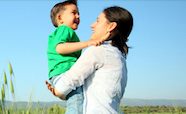 The NZ Mortality Review Data Group—Te Rōpū Kohi Pitopito Mōhiotanga mō te Taka Mate, was established in 2003 to support the national Child and Youth Mortality Review Committee (CYMRC). We now also support the Perinatal and Maternal Mortality Review Committee (established 2006), and since 2016, the Perioperative Mortality Review Committee.
The NZ Mortality Review Data Group—Te Rōpū Kohi Pitopito Mōhiotanga mō te Taka Mate, was established in 2003 to support the national Child and Youth Mortality Review Committee (CYMRC). We now also support the Perinatal and Maternal Mortality Review Committee (established 2006), and since 2016, the Perioperative Mortality Review Committee.
We have a contract with the Health Quality & Safety Commission to receive and store data, manage a database and provide data and research support for the above committees. We are also heavily involved in the CYMRC research programme. Having been involved in mortality review from the inception of the first still-existing national mortality review committee in 2002, we have a wealth of experience and expertise in this area.
The group receives information from a variety of sources, such as health, coronial, transport, water safety and child protection data, and data gained from the process of local review of each death, which is stored in a comprehensive database. This is a valuable resource that is being used increasingly to research areas of interest and importance.
We have expertise in mortality research, the process of mortality review, and the development of IT systems to support the above. Our team is made up of data and IT experts, research analysts and a clinical epidemiologist.
Email mortality.group@otago.ac.nz
Web https://secure-www.otago.ac.nz/nzmrdg
Otago Global Health Institute
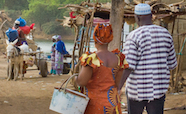 At the Otago Global Health Institute (OGHI), we foster partnerships to help solve global health problems. OGHI harnesses both technical and collaborative strengths across the Divisions, Schools, and Departments of the University of Otago to make them available to share with partners as we seek together to find solutions to complex global health problems.
At the Otago Global Health Institute (OGHI), we foster partnerships to help solve global health problems. OGHI harnesses both technical and collaborative strengths across the Divisions, Schools, and Departments of the University of Otago to make them available to share with partners as we seek together to find solutions to complex global health problems.
Email globalhealth@otago.ac.nz
Web otago.ac.nz/global-health
Research for Children Aotearoa
Whānau, Wellbeing and Health
The Research for Children Aotearoa collaborative brings together established research institutes, organisations, and communities to advance equitable, innovative, world-leading research for children. Proudly supported by Te Papa Hauora, this collaborative fosters research excellence across disciplines to strengthen impact across clinical, medical, sociological, and educational domains.
Te Papa Hauora is a strategic partnership between Canterbury's major tertiary and health institutions; the University of Canterbury, the University of Otago, Ara Institute of Canterbury and the Te Whatu Ora Waitaha, working together with representatives from Ngāi Tahu, a foundation member.
Email tony.walls@otago.ac.nz
Web healthprecinct.org.nz/research-for-children-aotearoa/
School of Pharmacy
 The School of Pharmacy has a very active research programme with disciplines ranging from science to humanities.
The School of Pharmacy has a very active research programme with disciplines ranging from science to humanities.
We have three main research areas:
- Pharmaceutical Sciences: drug discovery, drug metabolism and drug action to extend the range of drugs available and to provide a scientific basis for the quality use of medicines and bioactive substances.
- Clinical Pharmacy: concerned with patient care and the optimisation of medicine use in order to promote health and wellness, and prevent disease.
- Social Pharmacy: our research focuses mainly on access to, and use of medicines.
Our School of Pharmacy child health research page provides a taste of our relevant research.
Email pharmacy.research@otago.ac.nz
Web otago.ac.nz/pharmacy/research
Sir John Walsh Research Institute
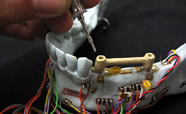 The Sir John Walsh Research Institute is the research arm of the Faculty of Dentistry at the University of Otago.
The Sir John Walsh Research Institute is the research arm of the Faculty of Dentistry at the University of Otago.
Oral health is essential for wellbeing. We lead the advancement of oral health research, and practice in New Zealand by combining the strengths of biological, clinical, and public health expertise. From the molecular level through biological systems to the health of populations, our research is improving oral health in New Zealand.
Our research objectives are:
- To develop clinical research that translates discoveries into measurable health benefits
- To maintain fundamental research that underpins our teaching
We are uniquely placed within the Faculty of Dentistry at the University of Otago—the only dental school in New Zealand, and ranked highly worldwide. This enables researchers and clinicians to work together to solve specific oral health problems and to rapidly translate findings into improved clinical practice.
Read more about some of our work in child oral health:
- Further funding success (Transformer Tooth and Hall Technique)
- Dunedin dental study "most read" article
Email sjwri.admin@otago.ac.nz
Web otago.ac.nz/sjwri/research
Social and Behavioural Research Unit
The Cancer Society Social and Behavioural Research Unit was established in 1990 with core funding from the Cancer Society of New Zealand and the support of the University of Otago. Presently it has research programmes operating in our six priority areas of tobacco control, ultraviolet radiation exposure, physical activity and nutrition, psycho-social-spiritual factors, alcohol, and Hauora Māori.
Email sbru@otago.ac.nz
Web otago.ac.nz/sbru
Te Rōpū Rangahau Hauora A Eru Pōmare
 Te Rōpū Rangahau Hauora a Eru Pōmare strives to create a Kaupapa Māori space committed to improving Māori health outcomes and eliminating inequalities through quality science and ongoing theoretical development. It takes a rights-based approach consistent with the Treaty of Waitangi, and is engaged with community through a spectrum of influence from community development, policy advocacy, research dissemination and Māori health research workforce development.
Te Rōpū Rangahau Hauora a Eru Pōmare strives to create a Kaupapa Māori space committed to improving Māori health outcomes and eliminating inequalities through quality science and ongoing theoretical development. It takes a rights-based approach consistent with the Treaty of Waitangi, and is engaged with community through a spectrum of influence from community development, policy advocacy, research dissemination and Māori health research workforce development.
Email bridget.robson@otago.ac.nz
Web otago.ac.nz/wellington/departments/publichealth/research/erupomare
